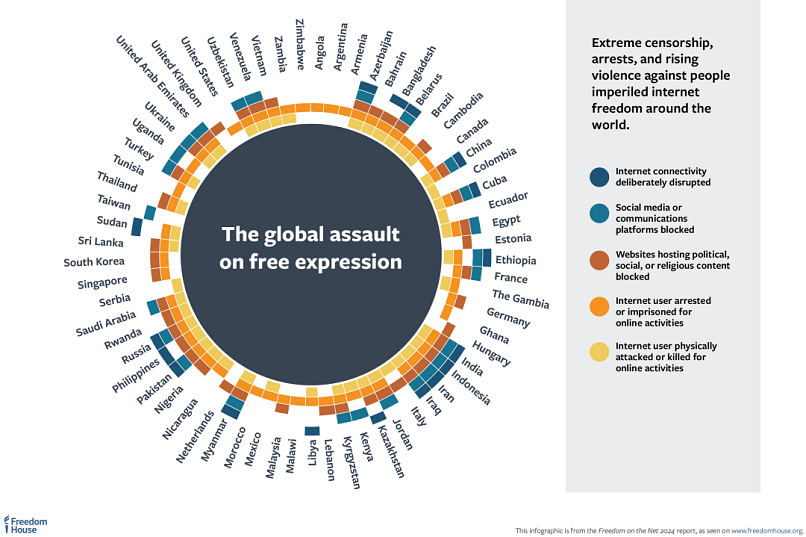Global Internet Freedom Declines for the 14th Year in a Row

Freedom House’s Freedom on the Net 2024 report exposed a continued global decline in internet freedom for the 14th consecutive year. It found that a significant number of governments across 72 analyzed countries employed censorship and violent retaliation for online speech, particularly during elections, to manipulate public opinion and suppress dissent.
According to Freedom House, global internet freedom has been steadily eroding, with protections for online human rights diminishing in 27 countries and only improving in 18. The report revealed that the sharpest decline occurred in Kyrgyzstan, while Zambia recorded the largest improvement. Alarmingly, 43 countries reported people being physically attacked or killed for their online activities, a record high since the report’s inception.
Other key findings from the Freedom on the Net 2024 report include:
- Election Censorship: In 25 of the 41 countries that held elections during the analysis period, authorities blocked websites, restricted access to social media platforms, or even temporarily cut off internet access.
- Retaliation for Online Expression: At least 56 countries saw individuals arrested for their political, social, or religious expression online, while physical violence in response to online speech occurred in at least 43 nations.
- Countries With the Least Internet Freedom: Myanmar and China shared the lowest internet freedom scores at 9 out of 100, with Myanmar experiencing a sharp decline since the military coup in 2021.
- Generative AI Used in Propaganda: Political campaigns used AI tools to produce memes, mock opponents, and manipulate content. This unregulated use of AI technology amplified disinformation. In 21 of the 41 countries that held or prepared for national elections, pro-government commentators spread false narratives, often to cast doubt on election integrity or discredit independent media.
- Countries Combating Disinformation: Some countries, including South Africa and Taiwan, implemented fact-checking initiatives and digital literacy campaigns.
Freedom House called for stronger measures to combat disproportionate government surveillance and the suppression of online dissent. Recommendations included promoting access to information, defending the integrity of online content, and boosting support for local civil society organizations.
With 2025 being a bumper year for elections worldwide, the report raises many concerns regarding the integrity of these processes in the future. Aside from government-backed censorship, voter data breaches, such as the one that occurred in Virginia, have also eroded trust in how elections are handled.



Please, comment on how to improve this article. Your feedback matters!